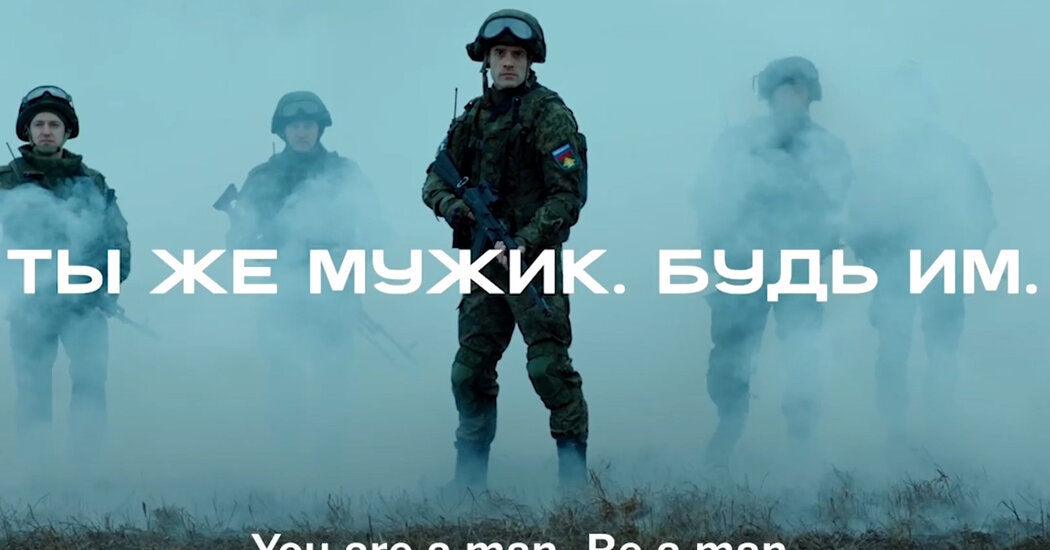- cross-posted to:
- mensliberation
- cross-posted to:
- mensliberation
A supermarket security guard, a taxi driver, a guy at the gym. The Russian government has a message for all of them: Aren’t you a man?
And don’t you want to earn more money?
Last spring, the Russian military kicked off a new recruitment drive for the war in Ukraine, seeking to replace tens of thousands of dead and wounded without having to resort to an unpopular draft. For the last four months, The New York Times has tracked how the campaign played out on Russian state television and social media, and found that recruitment messages focused on the Kremlin’s official rationale for the invasion — an existential threat from the West against Russians — played only a supporting role.
Rather, there were frequent appeals to masculinity, sometimes voiced by soldiers’ wives and other women interviewed on television news. There were incessant reminders of above-average pay and benefits for military servicemen. And the messages — appearing both in video ads produced by the Defense Ministry and on regular TV newscasts — stress the ease of signing up, promising relief from Russia’s notorious bureaucracy
The campaign appeared to start in April. Online, the Defense Ministry published a splashy video ad focusing on two central motivations: machismo, and money. It defines military service as more meaningful — and manly — than what’s depicted as the Russian man’s typical, humdrum existence. After moody shots of civilians transforming into modern warriors, the ad ends with a more down-to-earth reminder: “Monthly payments starting at 204,000 rubles,” or about $2,000.
The themes in the Russian Defense Ministry’s recruitment campaign are picked up frequently in television newscasts — as would be expected, since all of Russia’s major television channels are controlled by the state. But the news anchors and reporters delivering the message are essentially acting as glorified recruiters themselves, repeatedly reminding viewers of the quick-dial phone number — 1-1-7 — they can turn to if they want to sign up to fight.
tbf, that’s pretty much every military recruitment campaign anywhere in the world
I cannot confirm this for Germany. Here they especially try to get „gamers“ to sign up and therefor label most ads in pseudo youth and gamer speech, even puns. Their official slogan currently is „Wir schützen Deutschland“ (We Protect Germany). I like how hilariously descriptive and simple this is, considering how much marketing money probably went into that slogan.
Yeah, but the BW slogans still aim to the “cool, manly” crowd with that. “You like CoD? How about doing this cool shit IRL?”
Yeah, my thought was “So… the same way it’s sold on American TV?”
how it is actually: crying for your momma in a hole while a remote controlled drone drops grenades on your head
Holy shit $50k for a house?
Average monthly wage is $200-300. Some people without profession I know work for $100. Our housing market is still inflated, we just don’t earn shit.
And this price is for regional estate, mostly flats in soviet-era buildings. In capitals of regions, and especially Moscow, that’s laughable.
Yeah but in return you have to live in russia
house
Hamster cage in a brutalist concrete block.
PROS: Ok public transportation, herd of wild cats living in the basement is entertaining.
CONS: Limited rights, can’t buy most things, hard to travel, must take risks just to know the truth, might get dragged off to kill your neighbors in Ukraine, rampant alcoholism.
Don’t forget about no railings on balconies.
Well they have a 20cm thick slab of concrete for a railing, if that counts
Don’t trip! It’s the number 1 cause of death in Russia.
How about 20k if in the middle of nowhere?
How about $10k in Siberia?
You can learn to ignore ads everywhere, but to ignore they’d be a privileged and rich part of society, even after being released from prison some 10+ years earlier, is too much. No one praises a factory worker who struggles to put children into college and deal with bills\debts at the same time. Kind of a negative selection, and not for the first time.





